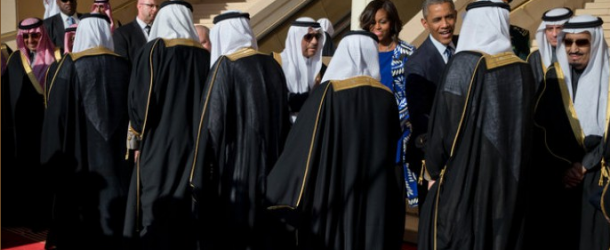Saudi Arabia and the United States are gradually transforming from allies to rivals. Different approach to the Syria issue only supplemented the wide array of other contradictions that have emerged in the recent years.
The situation in Syria has deteriorated in the recent weeks. Radicals succeeded in substantially pushing off the government troops in the Idlib province, threatening the incursion into other regions of the country. According to the analysts, all the successes of the Islamists relate to the deployment of fresh militants that underwent training in the camps set up by the U.S., Saudi Arabia and Qatar in the neighboring countries. Some even argue that the Bashar Assad regime is doomed.
However, there is a great deal of probability that the incumbent authorities in Damascus would withstand. And it is not just about the aid that Bashar Assad can expect from Iran, the extent of which is directly proportional to the threat against Damascus, but also, due to the fact the anti-Assad coalition has long lacked coherence as to how to handle the Syria issue.
The United States, for instance, wishes to continue with the training of militants in the camps located in the countries within the Syria’s neighborhood. Yet, it would be erroneous to claim that toppling of Bashar Assad was the ultimate objective of the White House. First, Obama is trying to escape the quicksand of the Middle Eastern politics and shift to the East Asia matters and therefore, such a costly, by all accounts, project of toppling Bashar Assad is senseless.
Second, the substitute for the Syrian President is unknown. Betting on a reputable opposition will fail – Bashar Assad managed to consolidate the entire reasonable Syrian elite and thus, the so-called ”moderate opposition” virtually has no credibility at home. The only alternative to Assad are the radical Islamists and the White House is reluctant to surrender such a large country to them. At least because the chances of Syria-Israel conflict erupting would increase and the U.S. would be obliged to step in, once again returning to the same quicksand.
And finally, the blatant course aimed at the ousting Bashar Assad could provoke serious ramifications for the Washington-Tehran relations and in the long-run derail the negotiations on Iran’s nuclear program. Therefore, Obama is not ready to jeopardize a deal that could be the biggest achievement of his administration. Just as he is not taking chances of going beyond the nuclear deal and concluding a comprehensive package agreement with Iran.
When it comes to Saudi Arabia, it is content neither with Bashar Assad staying in power nor with even formal compromise between the West and the Syrian President in the form of inviting several prominent Syrian opposition figures into the government. Riyadh seeks to oust the current regime in Damascus and vest radicals with power. It is only then that Syria would become the very ”second front” for Iran – something so badly needed by Saudi Arabia and rejected by Washington (during the negotiation process at least).
This is why Riyadh is doing its utmost to demonstrate its dismay to Washington. Hence, the snubbing of the Arab-U.S. Summit at Camp David by the Saudi King (and its vassal the King of Bahrain). This was done the day after the White House officially announced that King Salman would attend the summit. His Highness explained the sudden change of heart with hectic schedule – humanitarian ceasefire came into the effect in Yemen and the kingdom itself inaugurated the humanitarian center, where King’s presence was far more important than the meeting with the U.S. President.
It is quite illustrative that the summit, which the King snubbed was initiated by Obama precisely in connection with U.S.-Iran affairs – U.S. President needed to mollify his Arab allies. ”We are looking for security guarantee given the behavior of Iranin the region,” UAE Ambassador to the U.S. Youssef Al Otaiba said. “In the past, we have survived with a gentleman’s agreement with the United States about security … I think today we need something in writing. We need something institutionalized”. Obama certainly would not want to sign up to anything – U.S. President avoids assuming obligations on possible involvement with the Sunni-Shia war in the region. Saudi King is aware of that and therefore, chooses not to travel to Washington without a hope of forging an anti-Iran axis.
Instead, Saudi Arabia wants to cooperate with the Turks – the Western media have already reported that Ankara and Riyadh are together backing the opposition groups in Syria. Although Saudi Arabia is unlikely to see tremendous success, given the great probability that Turkey’s policy on the Syria front is likely to change. Turkish business community is dreaming of the Iranian market – the niche they intend to fill once sanctions against Iran were lifted. Therefore, Ankara will try to achieve normalcy in the relations with the Iranians that have deteriorated in the recent years. If such a trend prevails, the current destabilization in Syria could be regarded as Turks raising the stakes and solidifying their negotiation position. Thus, in this case, Turkey’s position is closer to the U.S.’s than to the Saudi Arabia’s.
If Riyadh fails to find influential allies, at least during the clash with Iran in Syria, the situation for the House of Saud will aggravate month-on-month. And, when America does normalize relations with Iran and increase own oil output to the extent that Saudi oil is rendered useless, it is possible that the American media and politicians would more frequently talk about the need of reforms for the regressive Saudi regime or even its change.
Rovshan ASLANOV
PhD in History

























































